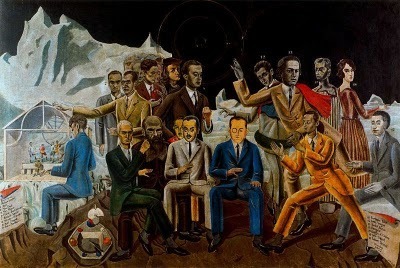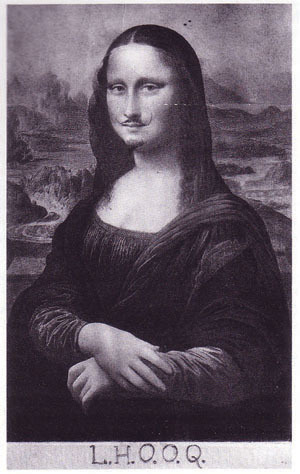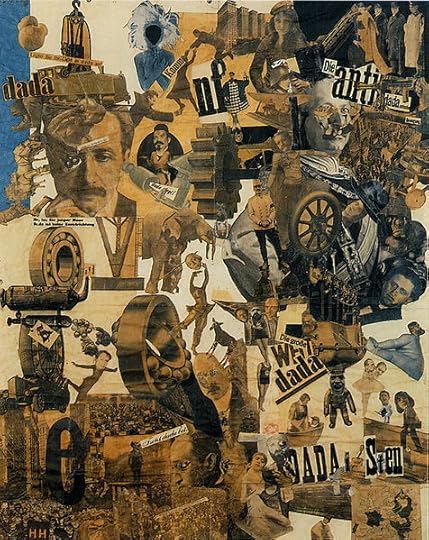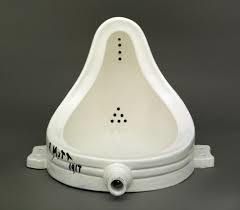Art Lovers discussion
Movements in Art
>
Dada
date newest »
newest »
 newest »
newest »
 Personally, I don't care for Dada art. This may be one reason I chose to begin with this movement.
Personally, I don't care for Dada art. This may be one reason I chose to begin with this movement. Just reading the Wikipedia description helped me understand a bit more the origin of this movement. Interesting how the name 'Dada' came from a knife stuck into the French dictionary! I am learning more, the fact that it was an anti-war makes a little bit of sense...I guess.
Please enlighten me anyone!


Max Ernst - At the Rendez-vous of Friend 1922
Seated from left to right: René Crevel, Max Ernst, Dostoievsky, Théodore Fraenkel, Jean Paulhan, Benjamin Péret, Johannes Baargeld, Robert Desnos. Standing: Philippe Soupault, Jean Arp, Max Morise, Raphaël, Paul Éluard, Louis Aragon, André Breton, Giorgio de Chirico, Gala Éluard
 Marcel Duchamp
Marcel DuchampFrancis Picabia
Man Ray
Tristan Tzara
Kurt Schwitters
A great site for Dada art...
http://www.dadart.com/dadaism/dada/02...
 My Dada explanation.
My Dada explanation. (Of course the problem is, as soon as you try to explain it, you look absurd trying to take a movement that is serious about attacking seriousness, seriously.)
I think it is the artistic equivalent of putting off dynamite in a mine shaft. All kinds of interesting things come tumbling out, minerals, gems, coal and so forth. It's dangerous work aesthetically. Especially, once Dada has run its course already, to be Dada today is really a challenge!
Here's some of the things that appeared in other art movements that relate to Dada. As I started out the list I started to be surprised by how many things popped up, even art movements that had nothing in common with Dada. Not to say that Dada was the cause of them, but, that it contributed to the history of art by making these ideas seem important:
1. since Dada made fun of making things to look like other things: abstraction
2. use of chance elements, letting materials have their voice: Surrealism, Abstract Expressionism
3. irrationality: Surrealism
4. protest: Social Realism, Mexican muralists
5. collage: Surrealism, Cubism
7. use of flat anti-illusionism, and literal materials: Cubism, abstraction
7 1/3. irrational imagery: Surrealism
8 1/4. freeing irrational impulses, automatism: Surrealism, Biomorphic Abstaction, Abstract Expressionism.
9.99999. Use of non-art materials or non-artistic subject matter in an ironical or absurd manner: Robert Rauschenburg's combines, Jasper Johns targets and flags, Pop Art
10. unusuAl arrangements of words and letterS: concrete poetry, experimental literature such as Gertrude Stein and James Joyce, Russian Suprematicist, and Bauhaus orthography
 Some images:
Some images:
Hausmann

Duchamp
The title is "LHOOQ" which when pronounced phonetically in French is slightly obscene.

Title Cut with the Dada Kitchen Knife through the Last Weimar Beer-Belly Cultural Epoch in Germany
Artist Hannah Höch (1889-1978)
Year 1919
They don't make titles like that anymore!
 Thank you for posting those, Ed. Now being exposed to a little more Dada art, I can say that I definitely don't like it.
Thank you for posting those, Ed. Now being exposed to a little more Dada art, I can say that I definitely don't like it.
 Video of an interview with Marcel Duchamp.
Video of an interview with Marcel Duchamp.https://www.youtube.com/watch?v=Bwk7w...
He toys with the interviewer.
 Ed wrote: "Some images:
Ed wrote: "Some images:Hausmann
Duchamp
The title is "LHOOQ" which when pronounced phonetically in French is slightly obscene.
Title Cut with the Dada Kitchen Knife through the Last Weimar Beer-Belly Cu..."
Hooray for Hannah Hoch. Just purchased her latest book. Funtastic artists.
 By the way, there's a show of Marcel Duchamp's paintings, including a large body of work,pre-Dada.
By the way, there's a show of Marcel Duchamp's paintings, including a large body of work,pre-Dada. Here's the article:
http://hyperallergic.com/151987/marce...
"PARIS — A nomadic but steady hand is clearly sensed in Marcel Duchamp’s work. He is often an excellent painter.... I suppose that I need not point out that Duchamp is generally perceived to be the artist who killed painting. OK, ça va, très bien — but this false fatality, as we well know, never actually happened. So what did happen? How did he influence painting after painting?"
 Dada and most of its offspring’s is merely an excuse for artwork by those who can’t draw and Paint. Most artwork in today’s Modern Art sections of museums has its origins in Dada and most critical babble supporting this stuff is pure Artspeak Dada.
Dada and most of its offspring’s is merely an excuse for artwork by those who can’t draw and Paint. Most artwork in today’s Modern Art sections of museums has its origins in Dada and most critical babble supporting this stuff is pure Artspeak Dada.
 Why Social Media is the New Dada Art Movement
Why Social Media is the New Dada Art Movement
By Sarah Day

Those who say history repeats itself are not wrong, especially if they are talking about art history. With infamous pieces such as The Fountain by Marcel Duchamp and The Spirit of Our Time by Raoul Hausmann, it is only reasonable that people would eventually emulate the styles pioneered during the Dada Movement.
The Dada Movement was an art movement from 1916 to 1924 and is known as the movement of “nothing” due to its nihilistic views. The movement was started in Switzerland as a reaction to World War I and the nationalism and traditionalism that was thought to have led to the war. The movement would come to influence other avant-garde movements such as Surrealism, Cubism, Futurism, Constructivism and Expressionism.
There is one art style that came out of Dada that has been copied by more than just artists over the last 100 years, which is the creation of photo collages. Now, most might think of this style as something they did in grade school for art class or as what their grandmother does when she scrapbooks, but the style is actually accredited to one of the few women of the Dada Movment, Hannah Höch.
Höch’s work was comprised of mostly newspaper and magazine clippings but also incorporated sewing and craft designs. Her most famous work is Cut with a Kitchen Knife Dada through the Last Weimar Beer Belly Cultural Epoch of Germany. The piece was commentary on German culture by literally cutting apart images and news articles and repositioning them to better reflect the culture of pre-war Germany.

Cut with a Kitchen Knife
While this all seems outlandish and abstract, many are starting to consider today’s meme and social media culture as the new age of Dada. Most millennials today use social media and many companies are also starting starting to get on board. And one of the most popular things to post are images called memes. Memes are images that play on pop and political culture through humor and are widely shared across all social media platforms. One of the main points of Dadaism was to point out the absurdity of everyday life and to force viewers to not separate art and life.
We see the similarities between Dada and internet culture through static images, but we can also find crossovers in styles and meanings in videos. Marcel Duchamp has arguably one of the most recognizable pieces from the Dada movement and that is his piece The Fountain, which is just a urinal laying on its back with his signature on the top. The piece was a commentary on the uselessness of objects when removed from their original context.

The Fountain
YouTube is one of the fastest growing platforms online and many studies have proven that videos on social media get the most engagement from the general public. It can be very easy to get lost in the digital vortex of the internet, especially once YouTube starts automatically playing videos for you. However, one theme you can find consistently throughout the internet and especially videos is the idea of rendering objects useless by taking them out of context.
Think about every video you have come across where the creator drops a computer or iPhone into a bathtub or sink. You have probably seen this kind of content more than a dozen times, but each time it is still just as startling as seeing a car accident as you drive by. You cannot look away although you know that the item was probably broken or useless before the content creator placed it in the water.
Still, seeing it submerged still takes you aback. This is the modern version of The Fountain. Just as the urinal cannot come back from being removed from the wall, the electronic item cannot be fixed after being fully submerged in water.
While we may never see internet memes in art museums like we do Dadaist pieces, it can still be helpful to look at internet culture as a way of understanding what the younger generations are thinking so that, as marketers, we can better communicate with them and evaluate their purchasing habits.
https://1seo.com/social-media-new-dad...
 Interesting ideas.
Interesting ideas.Dada, when it is not merely attempting to amuse jaded people often springs from periods of social disintegration, and the sense that all known paths are closed to us, and that only a senselessness can adequately convey this.
I recently found out that the rock band Devo, whose theatrics and costumes and attitude owe a lot to Dada theatre, was formed at by students who went to Kent State. They were there when the National Guard fatally fired live ammunition directly into protesting students.
 Ed wrote: "Interesting ideas.
Ed wrote: "Interesting ideas.Dada, when it is not merely attempting to amuse jaded people often springs from periods of social disintegration, and the sense that all known paths are closed to us, and that o..."
Great insight, Ed.
And wow! That's interesting the news about Kent State students! Makes a lot of sense with the Dada movement that before I read the article above, I didn't really understand. I know a bit more than I did and I can appreciate it more, even if I don't care for it.



Dada or Dadaism is a cultural movement that began in Zurich, Switzerland, during World War I and peaked from 1916 to 1922. "Dada was born out of negative reaction to the horrors of World War I. This international movement was begun by a group of artists and poets associated with the Cabaret Voltaire in Zurich. Dada rejected reason and logic, prizing nonsense, anarchy, irrationality and intuition. The name 'Dada' was reputedly arrived at during a meeting of the group when a paper knife stuck into a French-German dictionary happened to point to 'dada', a French word for 'hobbyhorse." The movement primarily involved visual arts, literature—poetry, art manifestoes, art theory—theatre, and graphic design, and concentrated its anti-war politics through a rejection of the prevailing standards in art through anti-art cultural works. Its purpose was to ridicule the meaninglessness of the modern world as its participants saw it. In addition to being anti-war, Dada was also anti-bourgeois and anarchistic in nature.
Dada is the groundwork to abstract art and sound poetry, a starting point for performance art, a prelude to postmodernism, an influence on pop art, a celebration of antiart to be later embraced for anarcho-political uses in the 1960s and the movement that lay the foundation for Surrealism.
http://en.wikipedia.org/wiki/Dada